Last week a friend mentioned in passing that Löwenbräu had changed their beer can size from the familiar 500ml to a paltry 473ml. Upon hearing this I was crestfallen, having been a devoted liege of the stalwart blue can since my youth (see the republished piece included below).
Quibbles over 27ml of 5.3% helles lager aside, insult was added to my injury when I happened to look at the can in question and discover that InBev, that powerful international conglomerate who own 49% of the sad anachronism that is The Beer Store, had made an executive decision to switch production from Munich, Germany to Labatt’s breweries in Canada.
Now you may spout guff about Canadian-jobs-for-the-boys, but whether it is union-made under license in London, Creston, Edmonton, Montreal, Halifax, or St. John’s, the fact remains that this Canadian-brewed approximation of Löwenbräu tastes utterly, utterly rank, and I swear that InBev shall rue the day they made this piss-poor decision to switch production to these shores.
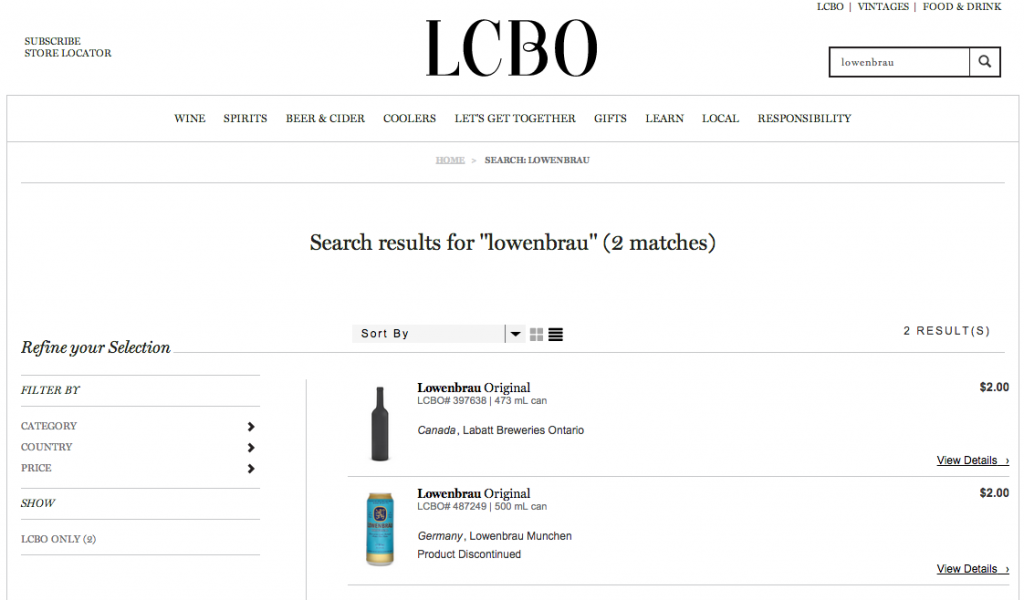
While you were sleeping Anheuser-Busch InBev, the Belgian-Brazilian multinational beverage and brewing company, quietly switched the brewing of our beloved Löwenbräu from Munich to Labatt Breweries of Canada… and they made the bloody cans smaller at the same time.
This week I spoke to a number of German Beer enthusiasts who were sorely disappointed with InBev’s surreptitious and downright underhand move:
I have to say that I am very disappointed that my beer of choice has quietly changed format. This deception influences my loyalty and will change my consumption habits. I am a loyal customer but this is betrayal – John Chabot, Toronto
They’ve taken a centuries-old Bavarian thirst quenching tradition and perverted it into a placeless, saccharine, industrial piss water of infantile swill – Malcolm Jolley, Good Food Revolution, Toronto
That. Beer. Tastes. Like a toilet seat. Fawk. It… it’s heinous – Jay Johnston, Grimsby
Maybe it’s the ingredients or maybe it’s because it’s brewed by Labatts, but this beer lover cannot support the current Lowenbrau product – Charles Perrault, Toronto
This Labatt-brewed Löwenbräu is a vile, insipid concoction that is but a mockery of the genuine centuries-old Munich-brewed article.
Make your voice heard and refuse to bow down to the will of the multinational.
I call for a full on boycott of this utter sham of a beer.

A lonely Munich-brewed blue can under a railway bridge in Parkdale before the switch to the Labatt-brewed travesty that today graces the shelves of our stores.
A Pean To The Blue Can: A Life Through Löwenbräu
First published on Good Food Revolution in February of 2012 and updated for this post.
“Here’s to good friends; tonight is kind of special,
The beer we’ll pour, must say something more, somehow,
So tonight, tonight, let it be Löwenbräu”– Vintage Löwenbräu Advertising Jingle circa 1965
Just the other week whilst working on an article and supping on a glass of my favoured “Go To” beer, I began to wonder just how much Löwenbräu I had consumed over my years upon this earth.
The results were most interesting and, considering my sizeable long-term investment in the brand, surely deserves an all expenses-paid trip to visit the Munich brewery at the very least?
I have enjoyed Löwenbräu since the age of 15, but in order to keep everything kind-of above board we’ll say that I began my consumption at the age of 18.
A very conservative evaluation of my weekly consumption would be somewhere in the region of 12 Löwenbräu almost each and every week.
Scratch that… Let’s be honest here, it’s actually closer to 16.
With 52 weeks in any given year this would mean 52 x 16 = 832 Cans Per Year
So, at 43 years old, and 25 years of enjoying Löwenbräu this would mean 832 x 25 = 20,800 Cans over the course of my 25 years drinking.
At a current cost of approximately $2.25 a can we are looking at an outlay of 20,800 x $2.25 = $46,800 invested in the liquids of Löwenbräu.
For the sake of this exercise we will be looking at the 500ml can of Löwenbräu (although over the years I have downed a fair number of draught pours) and so 20,800 x 500ml = 10,400,000 ml or 10,400 litres.
Rather than going through the rigmarole of measuring the water my body displaced from a rusty oil drum I chose to use the following method of calculating my body’s volume:
“The density of the human body is very close to that of water–that’s why most of us (depending on fat content) sink when we exhale and float when we inhale. Muscle weighs about 1.06 g/ml, and fat is .9 g/ml. And we are made mostly of water. So it’s pretty accurate to say that a 95 kg person has a volume of 95 liters. It’s probably accurate within 5% or so.” – From an online geek forum, posted by a character who went by the moniker of “Alan Thee Dominator“
I weigh (on a good day) 176 lbs,
That was some years ago… Let’s not kid anyone here and adjust for inflation.
I now weigh 186 lbs, which is the equivalent of 84.3682 kilograms… which I’ll round down to 84 kg and hence, using the aforementioned calculation, have a volume of 84 litres.
Taking my volumetric consumption of 10,400 litres and dividing by my body volume/weight, 10,400 ÷ 84 l/kg = 123.80
And so over the course of my life I can say with some confidence that I have consumed over 123 times my own (current) body volume and weight in beer brewed by Löwenbräu.
Oh, and when it comes to calories a 500ml can (or 17 Fluid Ounces) contains 233.75 of them.
So that means I have ingested 233.75 x 20,800 Cans = 4,862,000 Calories
Health Canada’s recommended calorie intake for males aged 31 – 50 with a “Low Active Lifestyle” is 2,700 Calories per day.
With this in mind, 4,862,000 ÷ 2,700 = 1,800 full days of my life have been fuelled by my favoured tipple… that’s just shy of five years.
Now if that doesn’t deserve a trip to the famous Löwenbräu Brewery then I don’t know what would!
I will never forget my very first Löwenbräu.
Indeed it was the very first pint of beer that I had ever ordered in a licensed establishment, albeit at the tender age of 15 years old.
This gratuitous disgard for the Scottish licensing laws took place at the much lamented Bo’s Bar, Carruber’s Close, Edinburgh, circa 1985, and was a misdemeanour that took a great deal of courage on my behalf.
It was accompanied not only by a complicit counterfeit i.d. (made out in the name of Pablo Gad, 667 Nelson Mandela Close, Leith) but also with a set of Citroen car keys that I had found in the street some weeks earlier, thinking that they would somehow add some much needed gravitas to my pathetic impersonation of a fully developed adult male of the species… a stylish masquerade that was augmented by the ginger bumfluff I had conspired to cultivate upon my top lip and chin over the preceding months leading up to this oh-so-special night.
Needless to say, the ever-diligent and by-the-book bar staff at Bo’s were so taken in by my crafty disguise upon that particular evening that they were more than happy to provide my eager babe’s mouth with not only one, not two, but THREE beautiful, chilled, deliciously illegal pints of Munich-brewed ambrosia. And that, I quickly discovered, was my limit.
Little did I know that from this fortuned/fated evening onwards the Löwenbräu lion would be my faithful companion as I stumbled along the Yellow Brick Road that was to be my future life…
Coincidentally, as as a related aside, in the same year as I lost my Löwenbräu cherry one of my favourite bedroom dancing records was The Pointer Sisters’ Neutron Dance from the film Beverly Hills Cop…
Who would have guessed that the Japanese would have been ripping off the same track for this gorgeous Löwenbräu television ad? It’s mind boggling.
My beloved blue-canned brew has quite the history, and a rather chequered one at that.
A brand begot in 1383, Löwenbräu is oft considered to one of the world’s very oldest brands, although the earliest recorded instance of the name is actually found in the Munich Brewers tax registry of 1746.
It appears that the name stems from the beer produced by the publican of Munich’s Zum Löwen, or Lions’ Inn. The connection to the lion supposedly comes from a story concerning an unfortunate beast that was chained to barrels of the brew in order to deter would-be pilferers, an image resurrected in a series of terrible US television ads in the 80’s. A fresco in the current brewhouse depicts Daniel in the Lions’ Den. Personally, the latter image sits better with me, being an animal lover and all that.
Beer folks so often bring up the Bavarian “Reinheitsgebot” purity law decreed by Wilhelm IV, Duke of Bavaria in 1516, you know, the one that limits the ingredients of German beer to the hallowed four: Water, Barley, Hops, and Yeast.
Not many folks realise that these rulings had been adhered to by Munich brewers some 30 years earlier, or that the ruling was not mandatory in Germany until 1906. No, nobody speaks about that bit.
The law also speaks in extravagant and explicit detail about the Medieval punishments that would be inflicted upon brewers for producing bad beer.
These punishments included public spanking, exile, and death. Many a Canadian brewer *coughLabattcough* would be quaking in their union-made boots if those laws were enforced in our fair country in these “enlightened” times.
Another little known fact about that much bandied about Bavarian Purity Act is that it prohibited the sale of a litre of German beer for any more than two Pfennigs, the Pfennig being an obsolete form of German currency.
Now this got me thinking…
2 Pfenigs = 2/100 of the also obsolete Deutsche Mark.
1.95583 Deutsche Mark or DEM = 1 Euro, so 2 Pfenigs would in today’s money be (0.002 x 1.95583) x 1 = 0.0039 Euros per litre
Multiply that by the number of litres I had calculated my lifetime consumption to have totalled, 0.0039 x 10,400 litres= 40.68 Euros
As I type the Canadian Dollar stands at 0.7 Euros and so 40.68 Euros would be = $57.81 Canadian as my entire expenditure upon Löwenbräu over my 40 years.
$57.81 on Lowenbräu in 43 years
…or something like that… I was never really very good at Mathematics, or Math as you North Americans call it for some bizarre reason that makes no sense to me whatsoever.
The very first Oktoberfest took place in Munich in 1810 to celebrate the marriage of crown prince Ludwig of Bavaria and Therese of Saxon-Hildburghausen, and to this day Löwenbräu is one of only six breweries permitted to serve beer at the festival (the others being Augustinerbräu, Hofbräuhaus, Hacker-Pschorr, Paulaner, and Spaten). Indeed Löwenbräu has been served at every Munich Oktoberfest since that very first celebration 202 years ago.
By the turn of the last century Löwenbräu was one of the biggest brewers in Europe although production was cut down by more than 50% during the First World War due to rationing.
In the years between the wars the brewer slowly returned to their pre-war production levels and by 1928 Löwenbräu was recorded as brewing over one million hectolitres annually, which is quite astonishing when one thinks about it:
1 million hectolitres = 100 000 000 litres
100 000 000 ÷ 10,400 litres (My total consumption at 43 years of age) = 9,615
That means that in one year the brewery was producing 9,615 times all the Löwenbräu I have ever enjoyed in my lifetime.
Hold on a moment, this is getting a bit scary… I now hope that my calculations are in some manner flawed.
In 1936, the Schüleins, an affluent Jewish family who were majority shareholders in the brewery, fled to the United States to escape the persecution of the brutal Nazi regime. Throughout the years of the Second World War Löwenbräu was referred to as “Jewsbeer” by the Nazis because of its connections to the family of Joseph Schülein.
The brewery was utterly devastated by the Allied bombing in the latter part of the war but was rebuilt some years later, and Löwenbräu became an industry leader with regards to export.
By the 1970’s Löwenbräu, one of the few larger breweries to produce their own malt, was using over 20,000 tonnes of barley a year.
During this period the United States only imported around 1% of their beer, and Löwenbräu quickly became its top German import, tying for market penetration with that sorry excuse for a beer from the Netherlands called Heineken.
Now here is where everything went seriously tits-up for the Lion’s Brew.
In 1974 Miller, a subsidiary of Philip Morris, took over the brand in North America, changing the recipe of the beer and brewing under licence within the United States. Other grains such as corn grit were added to the barley in the malt, and, according to Miller’s then main rival Anheuser-Busch Inc., were making shortcuts in the fermentation process.
Strangely enough Anheuser-Busch Inc. now own Löwenbräu.
Another interesting factoid is that it was for a while brewed by Labatt in Canada, labelled as “Imported Beer” and then shipped off to the US… it is really no wonder the beer garnered such an awful reputation for itself during this period.
In the United States the brand was being pitched with the rather teutonic sounding “This World Belongs To Löwenbräu” slogan, accompanied by some pretty rank television adverts.
Having always been a great believer in a certain degree of honesty in advertising I still feel that “Löwenbräu: It’s brewed by Miller and it’s utterly pish” would have been much more fitting…
Needless to say, sales tanked, falling by some 30% by 1989.
In typical Miller fashion a Löwenbräu Light was launched in order to “revitalise the brand”… Oh dear…
Thankfully the company eventually saw the error of their ways and returned the brewing operations to Munich.
As one of their more recent advertisements stated, “We all did embarrassing things in the 80’s”
How apropos.
In 2003 Löwenbräu was purchased by Belgian Brewery giant InBev for $537 million.
Despite being a staple libation of Chefs, Sommeliers, Lawyers, Marketing Professionals, underage and underbridge drinkers worldwide, as well as being offered in both discerning dining establishments and nefarious afterhours alike, Löwenbräu still appears to be a much maligned brew amongst the beer cognoscenti.
In fact attempting to garner a quote or two from some of my closest beer buddies proved itself to be quite the devil of an enterprise. But as is often the case with such matters, perseverance is key, and as I said to them “One cannot ALWAYS drink Craft beer…”:
“Ah, Lowenbrau. Drunk Litres of the stuff when in Munich. I profess to like it, and in fact their Oktoberfest bier too, though I must admit I’ve not had it for a year or two. Many in the beer community now sneer that they have been taken over by AB-InBev and that it’s now part of the same stable as Bud & Stella. However I hope against hope that the Germans put up more resistance to the AB-InBev accountants wanting to cut costs with inferior ingredients than the Czechs at Staropramen did. That went downhill at a fair lick once it went from Bass to InBev. Nuff said.” – Master Brewer Alex Barlow, All Beer, UK
“As a teenager, Lowenbrau for me would have been highly exotic and a “premium” import, much in the same way Stella Artois was considered the non plus ultra of beers in the Ontario market. I was horrified to discover later Europeans considered these brands the equivalent of Bud Lite.” – Malcolm Jolley, Good Food Revolution, Toronto
“My relationship with Lowenbrau goes back to May 22, 1969, when I went on the brewery tour in Munich and had a love-at-first-sight experience, which led to a relationship that lasted more than three years. I probably drank more of the stuff that day than I had before or since. I’ve always maintained a warm feeling for the beer, but not so warm that I actually want to drink it.” – Nicholas Pashley (Beer Writer and Author), Toronto
Löwenbräu simply checks all the boxes for me when it comes to an everyday beer, and over the years I have been its constant champion, even once enduring an assault by a feisty Fräulein after uttering the “L” word at a Bavarian Inn (albeit in NYC).
And the close of writing this diatribe/rant I wish that there were an ice cold blue can with my name on it slumbering in my fridge… but until InBev reverse their decision to brew the stuff in Canada, I fear I will be daydreaming of cans past for the foreseeable future.
So please never let it be said that I am a beer snob.
Now, about that trip to Munich, InBev… Hmmm… well I guess I have blown all chances of that now.
…
 Edinburgh-born/Toronto-based Sommelier, consultant, writer, judge, and educator Jamie Drummond is the Director of Programs/Editor of Good Food Revolution… And he is so very disappointed with Löwenbräu
Edinburgh-born/Toronto-based Sommelier, consultant, writer, judge, and educator Jamie Drummond is the Director of Programs/Editor of Good Food Revolution… And he is so very disappointed with Löwenbräu

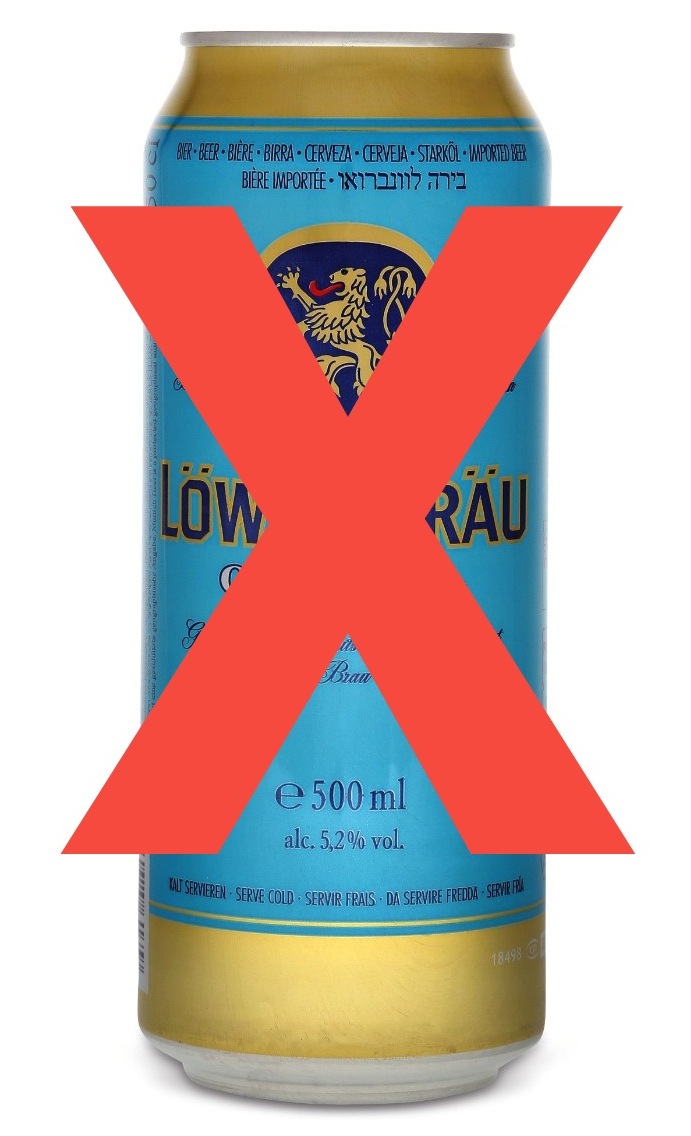
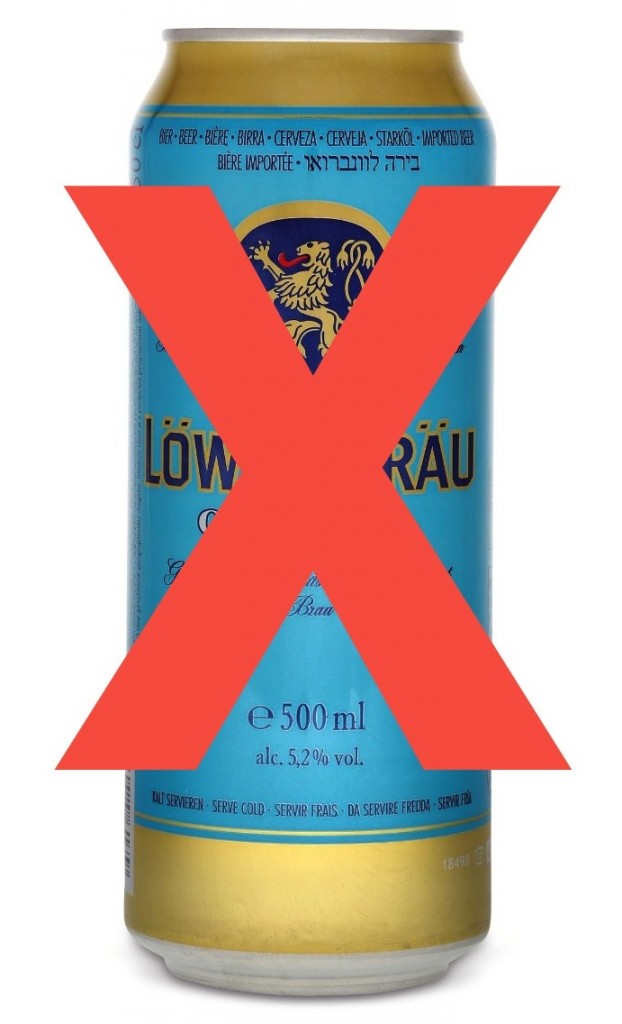



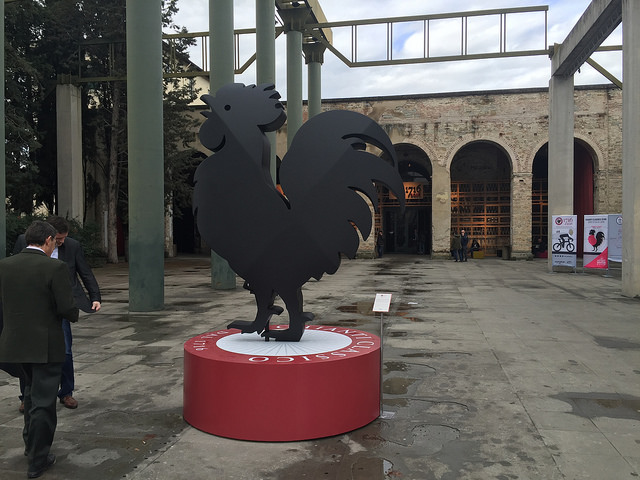
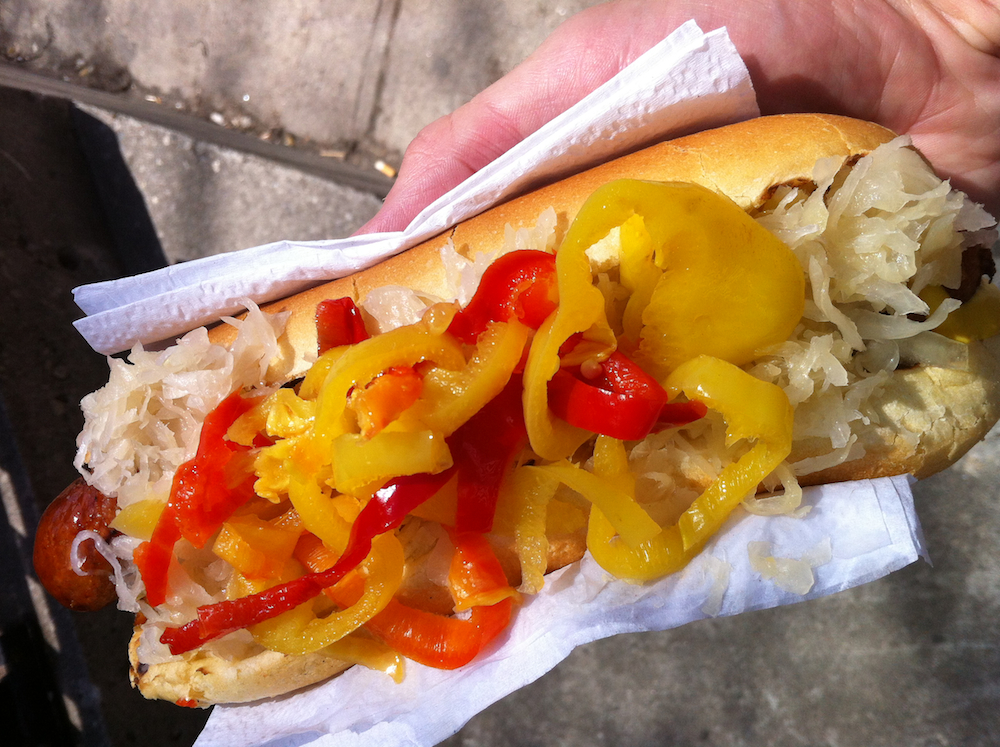
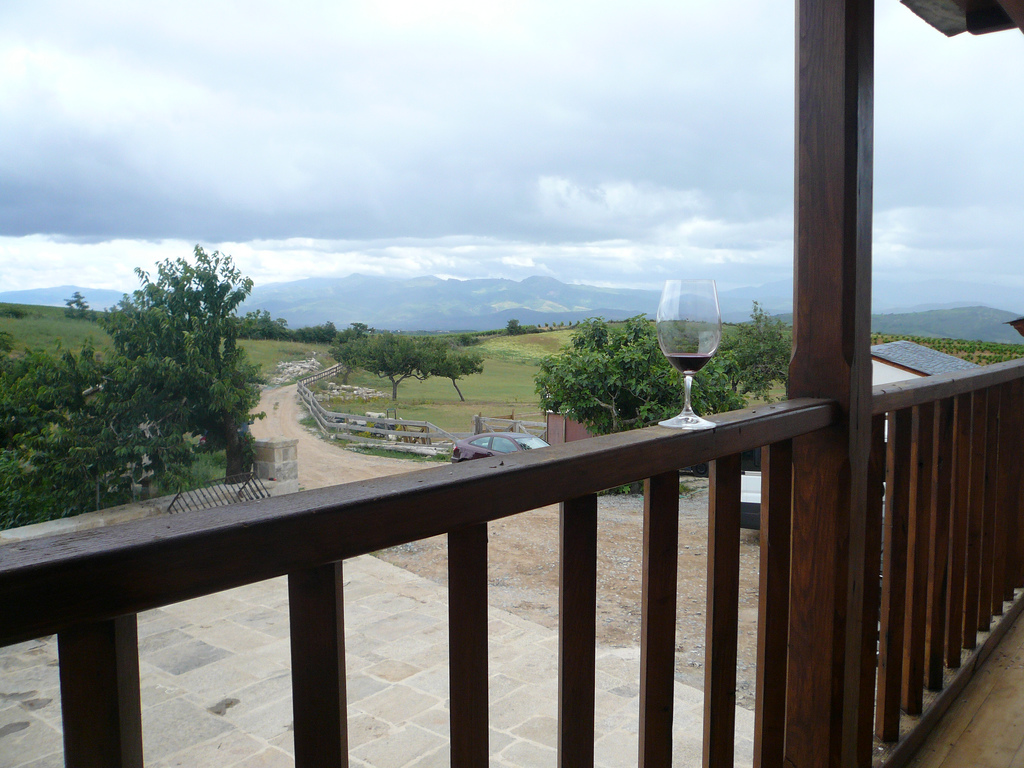


So here’s the thing, Jamie. Back in the day, Löwenbräu was brewed not by Labatt, but by Molson, and here’s an interesting story from that era. The at-the-time executive vp of brewing for Molson told me that when the company got the rights to the brand, they brewed it exactly as it was brewed in Munich — same ingredients, process, lagering, the lot. Problem was, they couldn’t sell the stuff, as Canadians of the time apparently didn’t want their Canadian-brewed German beer to actually taste like German beer. So the brewery started to lighten the flavour and make it more Canadian, and it started to sell.
Thing is that the executives from Germany would visit to check up on the brand, so I was told that once a year Molson would brew a totally authentic Löwenbräu and serve it to the brewery execs in the Molson boardroom. Said Germans would taste it and approve, and then return to Germany not knowing that, in the Canadian market, their beloved helles actually tasted more like Canadian than it did the German original.
I remember the Molson Lowenbrau a little differently. For all intents and purposes it was Moslon Canadian in a Lownebrau labelled bottle. I don’t ever reacall it tasting like Lowenbrau and my brother actually called Molson to complain that it not Lowenbrau any longer and he was told that it was brewed exactly the same and he was mistaken according to Molson. It never sold because it was obviouly not as good as actual Lowenbrau. Needless to say my brother and I and our buddies never bought it again untli they brought back the real stuff and now we are back to never buying it again.
Haha… that’s pretty funny! Thanks Stephen.
Glad I stockpiled with 4 cases for the holiday season after finding out that my favourite beer now tasted like sh*t! Will never buy another can of this beer while it’s being produced in Canada.
I stumbled on your site while I was looking for Lowenbrau’s non-existent English site; it looks like they don’t want to hear our opinions.
The last few times I have bought Lowenbrau, the taste has been “off”. I thought my taste buds were defective, or maybe I was drinking with the wrong food. It then occurred to me to read the can and the cause was obvious. The list of ingredients is absent, so presumably Labatts has added many of the 100+ additives that our uncaring government has authorised.
I can’t believe that this garbage is going to sell, unless people just want a cheap beer and don’t care what it tastes like. Labatts will certainly not get any more of my money.
Another beer that Labatts destroyed under licence is Busch. The US original is not bad; the Labatts metallic-tasting concoction is undrinkable, just like most of their other beers. How do they stay in business? It just shows the power of advertising; the impressionable masses will drink whatever they are told to drink.
I bought a few cans since I hadn’t had Lowenbrau in a few months and I immediately wondered why it tasted so bad compared to what I remembered.
The beer was very fizzy, the head disappeared almost immediately and left no trace. And the taste was just horrible. Then I go to check the ingredients thinking maybe they changed them and I see the its now brewed in Canada. Not only is the can smaller but they don’t even show us the ingredients, no doubt so we don’t get to see what kind of crap they’re putting in there.
Stay away from this beer until we start receiving the original from Germany again.
As a regular English bitter/ale drinker I am fairly shocked about the move by lowenbrau to sell up. I would occasionally have a pint of this brew due to its roots and the munich purity law,I find it crazy to change all this,who ever owns it!…if its not broke why change it! My suspisions were aroused when lowenbrau left the UK and came back some years later 0.2% weaker anx the 5.2% as we’re all used too. From that point I was done.It will not affect me to much due tk my bitter/ale tendencies,of which I might add that many small uk ale breweries are floreshing as people shy away from chemically infused fizzy wate(=shite) I hope people in the Uk do not take the bait and think they are drinking the original. I have my fears though as I have pals that drink fizzy junk and am sure they will drink this crap! For me though,its RIP LOWENBRAU.
I’ve been a loyal Lowenbrau drinker for many, many years, and I was lucky that a fellow Lowenbrau aficionado, who has a friend that works for the Beer Store in Ontario that gave him a head’s up about the switch to labatt’s becoming the brewer, passed the info on to me. I was able to find the last few cases of REAL Lowenbrau and buy them. I will NOT allow the swill now being passed off for Lowenbrau to pass my lips. Once the sales tank, and I hope that is SOON, and the morons who made this decision see the error of their ways and give us back our REAL Lowenbrau, I will return to the fold.
I couldn’t agree with you more, but I think we are facing a losing battle.
On a few occasions, I have seen people selecting cans of Lowenbrau at the LCBO, and each time I said “Do you realize that this is not real Lowenbrau; it is made by Labatts and it tastes really bad.” On each occasion I have received a blank look and they take it anyway. Maybe they will say “It tastes just like Blue; what’s the problem?”
I just hope that sales plummet.
BTW Why do the cans contain the word “Original”? That goes way beyond a blatant lie.
Just bought a single can of Lowenbrau, and realized the change in size (500ml – 473ml). Right away, I knew that it must have changed brewing locations. This beer is now completely different! It tastes like Kokanee! It lacks the malt taste that is associated with German beers (example Krombacher and Konig). I can’t believe this has happened! This beer is now Kokanee with fancy packaging, a total farce to the true Lowenbrau beer that we were all accustom to. I will never buy this beer again!
I just returned from the LCBO with six cans of Lowenbrau. Quickly chilled a can and poured it, hmm, that’s really gassy. Sat down and started to drink, hmm, this tastes really bad, maybe it’s gone off and that’s why they were selling it cheap ($2 per can). Did a search for Lowenbrau date codes amd came upon this site. It’s good to know what’s happened although it’s really sad – I used to really enjoy this beer.
So, it’s back to the LCBO tomorrow to return the remaining five cans of this garbage. I also will be avoiding this beer until they start importing the real thing again.
I thought my tasters were off… but no. it’s just a poorly made beer. I recall thinking the same thing earlier this year, and today’s imbibement seals it.
Boycott Löwenbräu:
I like their beer and I do enjoy sitting in their Gastgarten in Munich on my trips overseas. But I do have a complaint:
All beer imported into Canada from Germany and Austria is in the standard 500 ml (” a Halbe”) and so was Löwenbräu up until recently. Ever ”opportunistic”, they changed their size of cans to the (stupid) Canadian standard of 473 ml, but the can appears to contain, at first glance, the usual 500 ml. This is very sneaky and deceptive, since due to the lesser content, the price will be a bit lower, but the consumer still sees it at as 500 ml can. And to add insult to injury, it’s now brewed by Labatts in Canada!!
I will boycott this product from now on and alert all I know to this. Shame on you Löwenbräu!! Goodbye taste!
Folks, drink any of the others: Holsten, Becks, Stiegl, Gösser, Kaiser, Spaten etc. – all at the standard 500ml cans.
Pass this on!
This Lowenbrau is made by Labatts is nothing but Garbage. I will never buy another until it is made in Germany again. !!!!!
Went googling for reviews AFTER buying 6. Cans of this WRETCHED beer
Spent 10 years working in Germany – lived near the Lowenbrau Keller and loved it.
I could get closer to the original with home brew on the stove.
No taste. Flat. Awful
There’s now so much good beer available here in Ontario, no need to purchase from the big conglomerates. Support Ontario Kraft beers!
Spend 40% more for local! 😂
I’ve been searching for Lowenbrau in NH since mid-2013 when InBev stopped importing it to the USA. I recently had a friend bring me back a case of the Labatt version from Canada and it’s only vaguely like what I remember. Unfortunately there seems to be no way for the average consumer to get the Munich brewed Lowenbrau imported to the US these days, as none of the distributors that I have contacted import it.
Alas, this appears to be a truly international scandal.
Is this still the case ??
Now it costs $2.10 for a fake 473 ml can of German beer made with fructcose.
I just noticed that Spaten has joined the Lowenbrau ranks of beer brewed by Labatt’s. I guess I will stroke that one off my list!
I have no problem buying Ontario craft beers however I wish they would be a little cheaper. Hard to pass on a Hacker Pschorr that is cheaper then a craft beer from Ontario.
I am hoping to see Paulaner Helles in Ontario soon. Another great bavarian beer. It would also be great to see some more Austrian beers come to Canada. Puntigamer and Zipfer are very popular and great brews from Austria. Nice to see that the Beer Store has Ottokringer from Austria.
http://staging.goodfoodrevolution.com/dont-try-this-hell-dont-buy-this-spaten-another-beer-bites-the-dust/
Here in Australia I spotted a carton of 12 x 440ml cans of Lowenbrau at a good price and so ended up buying 3. After tasting the stuff I thought it wasn’t what I remembered but put it down to having a head cold at the time. Tried it again and thought it was a bit weak and checked the can…..alcohol percentage 3.5% !!! The can is exactly the same blue can with the lion crest. Surely this has to be illegal, certainly it is unethical. Also checked where it was from….brewed in the UK ! This despite the statement under the crest stating “A Beer of Bavaria”. Lowenbrau should be ashamed of themselves, totally deceptive. If it’s 3.5% alcohol then the can should be a completely different colour.
Same thing here in the UK . Lowenbrau hasn’t really been on sale here since the eighties and then it suddenly started popping up for sale in two German budget supermarkets calked Aldi and Lidl. You’d think you were getting the real deal in a German store, but no, it’s some rip off 3.5% piss being passed of as the premium stuff!
I am disappointed too, but this is not due to Lowenbrau but the Canadian canning production, the Lowenbrau canned in Canada is 473 ml, because the Canadian canning factory sources its cans from the US, where the 473 ml is a standard size.
it’s certainly disappointing to see that after more than 55 years of adapting he metric system, the Canadian producers are still struggling to get the metric volume right. I wish we would have just made metric volume: 500 ml, 750 ml, 1000 ml. etc.
Amen
Lowenbrau is an insult to German beer just as Tuborg is to Danish.
Its insipid taste is an indication of it being brewed by a conglomeration so shame on the original company for selling out.
The best German beer I have had is brewed by Schneider Weisse, followed by Hacker-Pschorr, Erdinger and Paulanen. I can also highly recommend Franciskaner which unfortunately is not available through the LCBO.
I’m on board with everyone here, and have been looking for a place to vent my rage with Labbatt & Carlsberg for destroying great beers. I’d been a loyal Lowenbrau consumer since I was 14. After it started being brewed in Canada, they lost me as a loyal customer. My first taste of this was exactly what I expected, shit. There was no comparison to the original taste, it actually tasted like Labbat’s Blue. To add insult to injury they gave us less beer and charged MORE for it.
After that loss I needed to find a reasonable replacement and I found Spaten. I liked it so I adapted. A few months later I see Labbatt/Carlsberg had done the same thing! Then I went to Tuborg Gold, which I really liked, until I started seeing them disappear from the shelves. I had their MO down, so I bought 6 cases of 24. It silently disappeared and was replaced with the bilgewater we have today, again less beer and more money! My last straw was with Holsten. I very much liked their entire lineup and favoured their Maibock variety. Then the beer Nazi’s struck again, with the entire lineup. I am drinking DAB Maibock now, but does not have that creamier taste Holsten had.
There really should be something we can do, as it is so unfair to be treated like this!
They have maintained all of the design on the can, and only adding it is Canadian in small print.
Isn’t there a law that prevents misinterpretation like this?
We had no notice at all about the change.
If the original master brewers from these beers could tasted this piss, they would roll over in their graves!
I understood these brewers had a lot of pride in their product and cared about their customers.
It seems that has gone away here as well.
If we can start a petition against this lying and cheating, I’m in.
I thought this was just in Canada, so this is now an international crime!
Thank you for providing a space top rant about this!